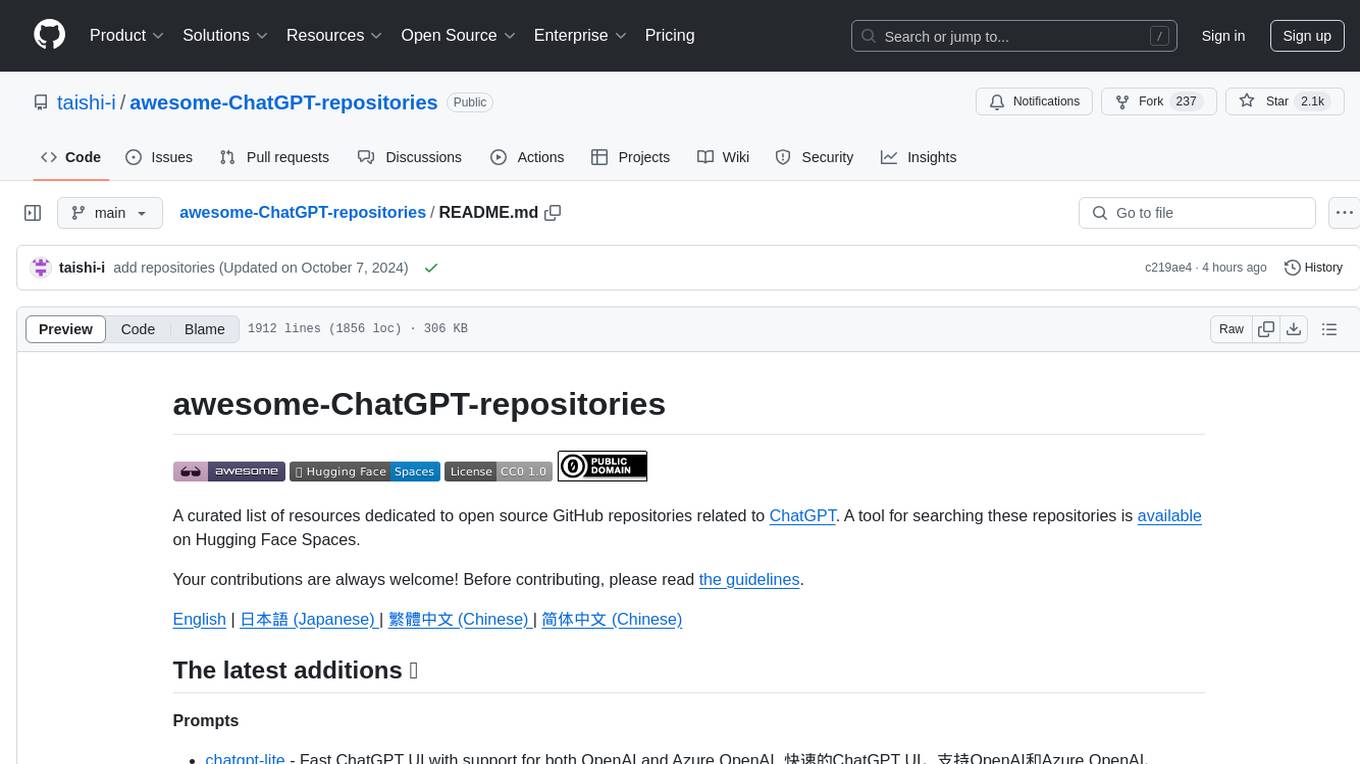
genai-quickstart-pocs
This repository contains sample code demonstrating various use cases leveraging Amazon Bedrock and Generative AI. Each sample is a separate project with its own directory, and includes a basic Streamlit frontend to help users quickly set up a proof of concept.
Stars: 381
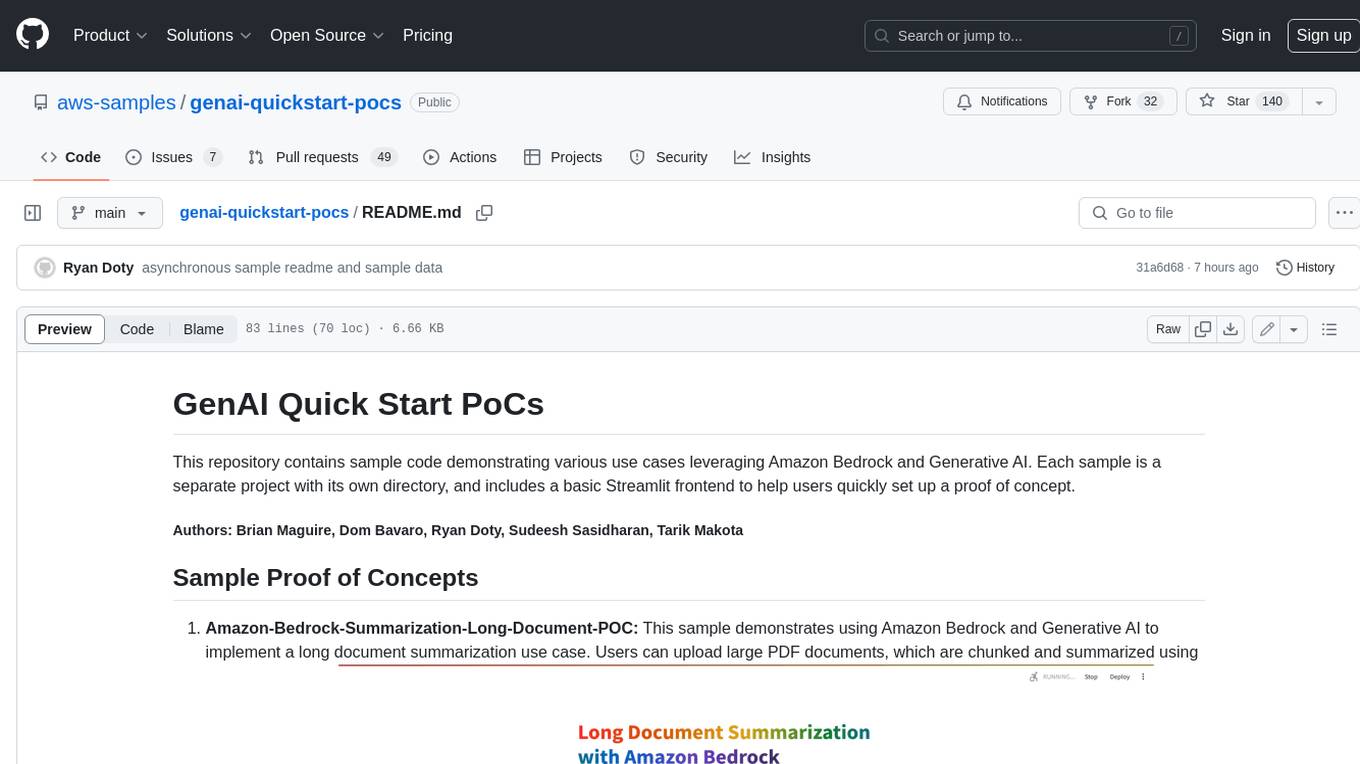
This repository contains sample code demonstrating various use cases leveraging Amazon Bedrock and Generative AI. Each sample is a separate project with its own directory, and includes a basic Streamlit frontend to help users quickly set up a proof of concept.
README:
This repository contains sample code demonstrating various use cases leveraging Amazon Bedrock and Generative AI. Each sample is a separate project with its own directory, and includes a basic Streamlit frontend to help users quickly set up a proof of concept.
-
Amazon Bedrock Alt Text Generator This POC demonstrates how to use the Amazon Bedrock Alt Text Generator to generate alt text for images in PDF documents.
-
Amazon Bedrock Amazon Athena POC This is sample code demonstrating the use of Amazon Bedrock and Generative AI to use natural language questions to query relational data stores, specifically Amazon Athena. This example leverages the MOMA Open Source Database: https://github.com/MuseumofModernArt/collection.
-
Amazon Bedrock & Amazon RDS POC This is sample code demonstrating the use of Amazon Bedrock and Generative AI to use natural language questions to query relational data stores, specifically Amazon RDS. This example leverages the MOMA Open Source Database: https://github.com/MuseumofModernArt/collection.
-
Amazon Bedrock & Amazon Redshift POC This is sample code demonstrating the use of Amazon Bedrock and Generative AI to use natural language questions to query relational data stores, specifically Amazon Redshift. This example leverages the MOMA Open Source Database: https://github.com/MuseumofModernArt/collection.
Please Note: If you don't want to build this from scratch, Amazon Redshift now supports GenAI capabilities natively, more information on that can be found here.
-
Amazon Bedrock Asynchronous Invocation POC This is sample code demonstrating the use of Amazon Bedrock and Generative AI to perform asynchronous invocations of large language models. The application is constructed with a simple streamlit frontend where users can input zero shot requests directly against the LLM of their choice, leveraging asynchronous invocations, to invoke 3 models simultaneously to reduce overall latency.
-
Amazon Bedrock Chat POC Amazon Bedrock Chat POC
-
Amazon Bedrock Claude 3 Image Analysis POC This is sample code demonstrating the use of Amazon Bedrock and Multi-Modal Generative AI models from Anthropic to implement an image analysis use case. The application is constructed with a simple streamlit frontend where users can upload a 1 page jpeg, png or PDF and get a description of the image.
-
Amazon Bedrock Claude 3 Long Form Output POC This is sample code demonstrating the use of Amazon Bedrock and Generative AI to translate text from a source to target language.
-
Amazon Bedrock Claude 3 Multi-Modal POC This is sample code demonstrating the use of Amazon Bedrock and Anthropic Claude 3 to satisfy multi-modal use cases. The application is constructed with a simple streamlit frontend where users can input zero shot requests to satisfy a broad range of use cases, including image to text multi-modal style use cases.
-
Amazon Bedrock Claude 3 Streaming Response POC This is sample code demonstrating the use of Amazon Bedrock and Generative AI to implement streaming responses. The application is constructed with a simple streamlit frontend where users can input zero shot requests directly against the LLM of their choice, leveraging a streaming response technique.
-
Amazon Bedrock Converse API POC This is sample code demonstrating the use of the Amazon Bedrock Converse API to help with conversation oriented use cases that require context preservation. The application is constructed with a simple streamlit frontend where users can input zero shot requests to Claude 3, with the Amazon Bedrock Converse API in place to allow users to ask context aware questions.
-
Amazon Bedrock Converse Stream API POC This is sample code demonstrating the use of the Amazon Bedrock ConverseStream API to help with conversation oriented use cases that require context preservation. The application is constructed with a simple streamlit frontend where users can input zero shot requests to Claude 3, with the Amazon Bedrock ConverseConverseStream API in place to allow users to ask context aware questions and stream the response back.
-
Amazon Bedrock CSV Chatbot POC This is sample code demonstrating the use of Amazon Bedrock and Generative AI to implement a chatbot is able to converse with the user based on CSV data provided by the user. The application is constructed with a simple streamlit frontend where users can upload large CSV files and get them analyzed or start chatbot interactions.
-
Amazon Bedrock Document Comparison POC This is sample code demonstrating the use of Amazon Bedrock and Generative AI to implement a document comparison use case. The application is constructed with a simple streamlit frontend where users can upload 2 versions of a document and get all changes between documents listed.
-
Aamazon Bedrock Document Generator POC This is sample code demonstrating the use of Amazon Bedrock and Generative AI to implement a document generation use case. The application is constructed with a simple streamlit frontend where users can provide details and create a document in the exact format that the you specify.
-
Amazon Bedrock GenAI Dynamic Prompt Explained POC This is sample code that can be used to provide a hands on explanation as to how Dynamic Prompting works in relation to Gen AI. The application is constructed with a simple streamlit frontend where users can ask questions against a Amazon Bedrock supported LLM and get a deeper understanding of how few-shot and dynamic prompting works.
-
Amazon Bedrock Guardrails POC This is sample code demonstrating the use of Amazon Bedrock Guardrails to help prevent prompt-injection attacks and prevent unintended responses from the LLM. The application is constructed with a simple streamlit frontend where users can input zero shot requests to Claude 3, with Amazon Bedrock Guardrails in place to prevent malicious prompts and responses.
-
Amazon Bedrock Image Generation POC This is sample code demonstrating the use of Amazon Bedrock and Generative AI to implement an image generation use case. The application is constructed with a simple streamlit frontend where users can input text requests to generate images based on the text input.
-
Amazon Bedrock Image Generation with Guardrails This sample code demonstrates using Amazon Bedrock Guardrails to prevent Stability Diffusion LLM from generating harmful, obscene, or violent images. The application features a streamlit frontend where users input zero-shot requests to Claude 3. Amazon Bedrock Guardrails determine whether to proceed with generating images using the Stability Diffusion model.
-
Amazon Bedrock Intelligent Document Processing (IDP) POC This is sample code demonstrating the use of Amazon Bedrock and Generative AI incorporated into an Intelligent Document Processing (IDP) pipeline using user-uploaded documents. The application is constructed with a simple streamlit frontend where users can upload various document formats and perform different IDP actions such as text extraction, document summarization and classification, entity recognition, and Q&A to satisfy a broad range of use cases.
-
Amazon Bedrock Knowledgebases RAG POC This is sample code demonstrating the use of Amazon Bedrock and Generative AI to create vector embeddings for your data sources using Amazon Bedrock Knowledge bases with the ability ask questions against the stored documents. The application is constructed with a RAG based architecture where users can ask questions against the Knowledge bases.
-
Amazon Bedrock LangChain RAG POC This is sample code demonstrating the use of Amazon Bedrock and Generative AI using Langchain as orchestrator with the ability ask questions against the stored documents. This sample uses Knowledge bases as to retrieve the stored documents, however you can extend or update this sample to retrieve your stored documents from any Vector DB.
-
Amazon Bedrock Meeting Minutes Summarization POC This application demonstrates using Amazon Bedrock and Amazon Transcribe to summarize meeting recordings. The streamlit frontend allows users to upload audio, video, or text files of meeting recording. Amazon Transcribe generates a transcript of recording and sent it Amazon Bedrock for summarization of the key discussion points. Users can then download the generated summarized meeting notes.
-
Amazon Bedrock Model Customization This sample leverages Jupyter Notebooks to demonstrate how to customize bedrock models.
-
Amazon Bedrock Model Evaluation Data Prep Tool This is sample code aimed to accelerate customers aiming to leverage Amazon Bedrock Model Evaluator with custom prompt data. This Proof-of-Concept (POC) enables users to provide a CSV containing data that should be used with Amazon Bedrock Model Evaluator. The user then maps the CSV columns to the appropriate fields depending on which type of Model Evaluation being executed. This will generate one or more
.jsonlformatted files, ready for use with Amazon Bedrock Model Evaluator. -
Amazon Bedrock Model Playground POC This is sample code demonstrating the use of Amazon Bedrock and Generative AI to implement a Gen AI model playground. The application is constructed with a simple streamlit frontend where users can input zero shot requests and select any LLM offered by Amazon Bedrock.
-
Amazon Bedrock PowerPoint Generator This is sample code demonstrates the use of Amazon Bedrock and Generative AI to implement a PowerPoint generator. The application is constructed with a simple streamlit frontend where users can input a topic and get a PowerPoint generated based on the topic. Using Generative AI, the solution creates relevant Wikipedia queries to perform in-depth research on the presentation content.
-
Amazon Bedrock RAG with Kendra POC This is sample code demonstrating the use of Amazon Bedrock and Generative AI to implement a RAG based architecture with Amazon Kendra. The application is constructed with a simple streamlit frontend where users can ask questions against documents stored in Amazon Kendra.
-
Amazon Bedrock RAG with OpenSearch Serverless POC This is sample code demonstrating the use of Amazon Bedrock and Generative AI to create custom embeddings stored in Amazon OpenSearch Serverless with the ability ask questions against the stored documents. The application is constructed with a RAG based architecture where users can ask questions against the indexed embeddings within OpenSearch Serverless.
-
Amazon Bedrock Semantic Cache POC This project demonstrates a Retrieval-Augmented Generation (RAG) system using Amazon Bedrock for knowledge retrieval and OpenSearch for semantic caching. It provides a Streamlit-based user interface for asking questions about data stored in Amazon Knowledge Bases.
-
Amazon Bedrock Speech to Text POC This is sample code demonstrating the use of Amazon Bedrock and Generative AI to implement a ChatGPT alternative using speech-to-text prompts. The application is constructed with a simple streamlit frontend where users can provide zero shot requests using their computer’s microphone and listen to responses to satisfy a broad range of use cases.
-
Amazon Bedrock Streaming Response POC This is sample code demonstrating the use of Amazon Bedrock and Generative AI to implement streaming responses. The application is constructed with a simple streamlit frontend where users can input zero shot requests directly against the LLM of their choice, leveraging a streaming response technique.
-
Amazon Bedrock Summarization of Long Documents POC This is sample code demonstrating the use of Amazon Bedrock and Generative AI to implement a long document summarization use case. The application is constructed with a simple streamlit frontend where users can upload large documents and get them summarized.
-
Amazon Bedrock Task Classification POC This sample code demonstrates how to use Amazon Bedrock and Generative AI to implement a task classification bot. The application is constructed with a simple streamlit frontend where users can input a task and get the correct classification which then trigger appropriate downstream workflows to process the task inputted.
-
Amazon Bedrock Text Extraction POC This is sample code demonstrating the use of Amazon Bedrock and Generative AI to extract text from a document. The application is constructed with a simple streamlit frontend where users leverage Bedrock Agents to extract and summarize key information from a document like a financial earnings report.
-
Amazon Bedrock Translation POC This is sample code demonstrating the use of Amazon Bedrock and Generative AI to translate text from a source to target language. Additionally, this demo also includes an Amazon Translate usecase.
-
Amazon Bedrock Video Chapter Creator POC This is sample code demonstrating the use of Amazon Transcribe, Amazon OpenSearch Serverless, Amazon Bedrock and Generative AI, to a implement video chapter generator and video search sample. The application is constructed with a simple streamlit frontend where users can upload a video that will be stored, transcribed and have searchable chapters generated. Additionally, if you have videos already uploaded to S3 and have subtitles for the video already created in
.srtformat, you can skip transcribing and jump straight into generating chapters.The sample also includes a second UI that allows the user to ask about a topic. This will search the video chapters from the videos you've provided and provide a video, set to a specific chapter, that was the closest match to the inquiry.
-
Amazon Bedrock Converse API POC This repository contains sample code demonstrating various use cases leveraging Amazon Bedrock and Generative AI using Amazon Bedrock SDK for .NET. Each sample is a separate page within a Visual Studio Solutions, and includes a basic Blazor frontend to help users quickly set up a proof of concept.
-
Amazon Bedrock Document Generator POC This is sample code demonstrating the use of Amazon Bedrock and Generative AI to create content for documents.
-
Amazon Bedrock Guardrail POC This is sample code demonstrating the use of Amazon Bedrock Guardrails to help prevent prompt-injection attacks and prevent unintended responses from the LLM. The application is constructed with a simple ASP.NET Blazor frontend where users can input zero shot requests to Claude 3, with Amazon Bedrock Guardrails in place to prevent malicious prompts and responses.
-
Amazon Bedrock Knowledgebases RAG POC This repository contains sample code demonstrating various use cases leveraging Amazon Bedrock and Generative AI. Each sample is a separate project with its own directory, and includes a basic Streamlit frontend to help users quickly set up a proof of concept.
-
Amazon Bedrock RAG Kendra POC This is sample code demonstrating the use of Amazon Bedrock and Generative AI to implement a RAG based architecture with Amazon Kendra.using Amazon Bedrock SDK for .NET. The application is constructed with a simple blazor front-end where users can ask questions against documents stored in Amazon Kendra.
- Model Context Protocol (MCP) based Shipment management System MCP based system that monitors weather conditions to proactively identify and notify customers about potential shipping delays. This microservices architecture combines weather data from the National Weather Service with shipment tracking to ensure timely communication about weather-related delivery impacts.
- Amazon Bedrock Access and CLI Credentials
- Python 3.10 installed on your machine
- Additional prerequisites specific to each sample (e.g., RDS Database, Amazon Kendra index, etc.)
- Amazon Bedrock Access and CLI Credentials (Please ensure your AWS CLI Profile has access to Amazon Bedrock!)
- .NET 8.0
- Visual Studio installed on your machine
- Additional prerequisites specific to each sample (e.g., RDS Database, Amazon Kendra index, etc.)
- Configure the necessary environment variables (e.g., AWS credentials, database connections, etc.).
- Access to Claude 3 haiku model. Please follow this AWS Documentation to get access to the model.
- Run Blazor app
- Clone the repository.
- Navigate to the desired sample directory.
- Set up a Python virtual environment and install the required dependencies.
- Configure the necessary environment variables (e.g., AWS credentials, database connections, etc.).
- Run the Streamlit application using the provided command.
Detailed instructions for each sample are provided in their respective directories.
See CONTRIBUTING for more information.
This library is licensed under the MIT-0 License. See the LICENSE file.
For Tasks:
Click tags to check more tools for each tasksFor Jobs:
Alternative AI tools for genai-quickstart-pocs
Similar Open Source Tools

genai-quickstart-pocs
This repository contains sample code demonstrating various use cases leveraging Amazon Bedrock and Generative AI. Each sample is a separate project with its own directory, and includes a basic Streamlit frontend to help users quickly set up a proof of concept.
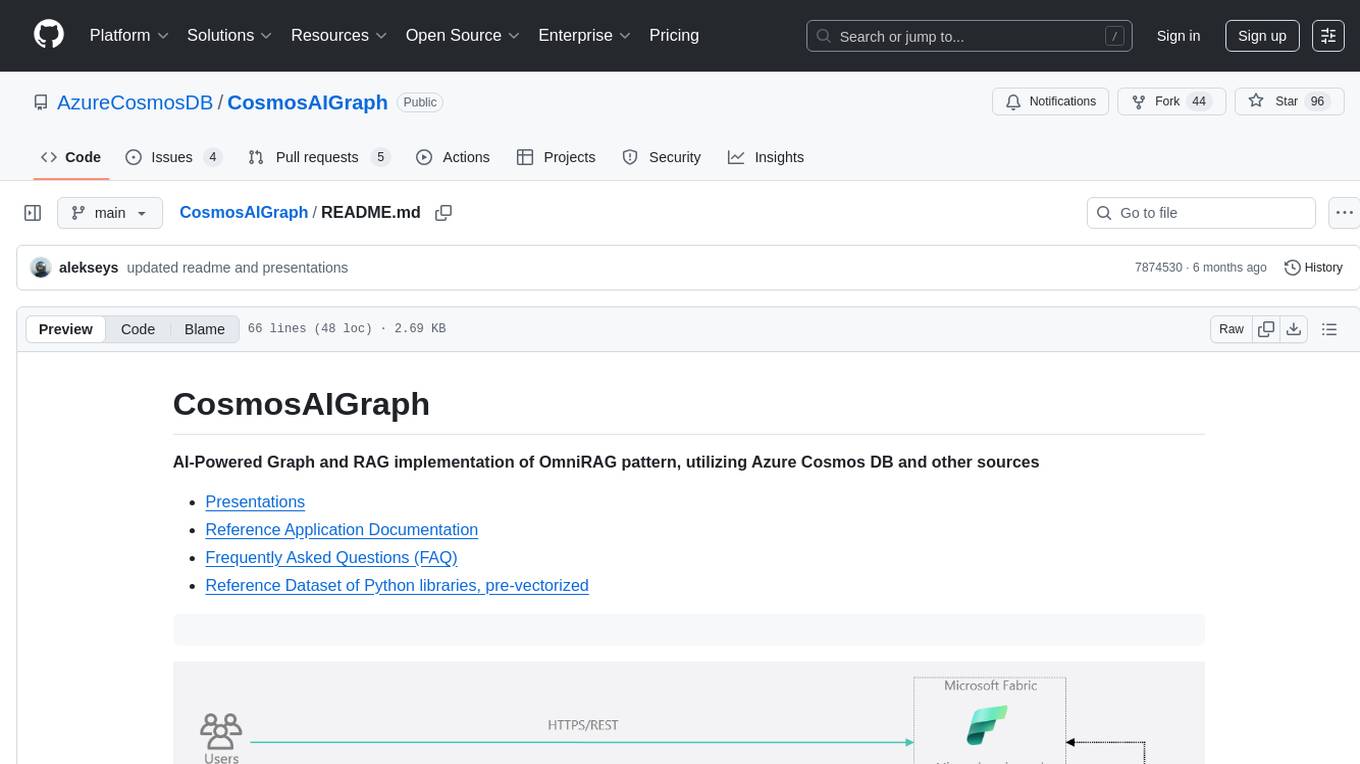
CosmosAIGraph
CosmosAIGraph is an AI-powered graph and RAG implementation of OmniRAG pattern, utilizing Azure Cosmos DB and other sources. It includes presentations, reference application documentation, FAQs, and a reference dataset of Python libraries pre-vectorized. The project focuses on Azure Cosmos DB for NoSQL and Apache Jena implementation for the in-memory RDF graph. It provides DockerHub images, with plans to add RBAC and Microsoft Entra ID/AAD authentication support, update AI model to gpt-4.5, and offer generic graph examples with a graph generation solution.
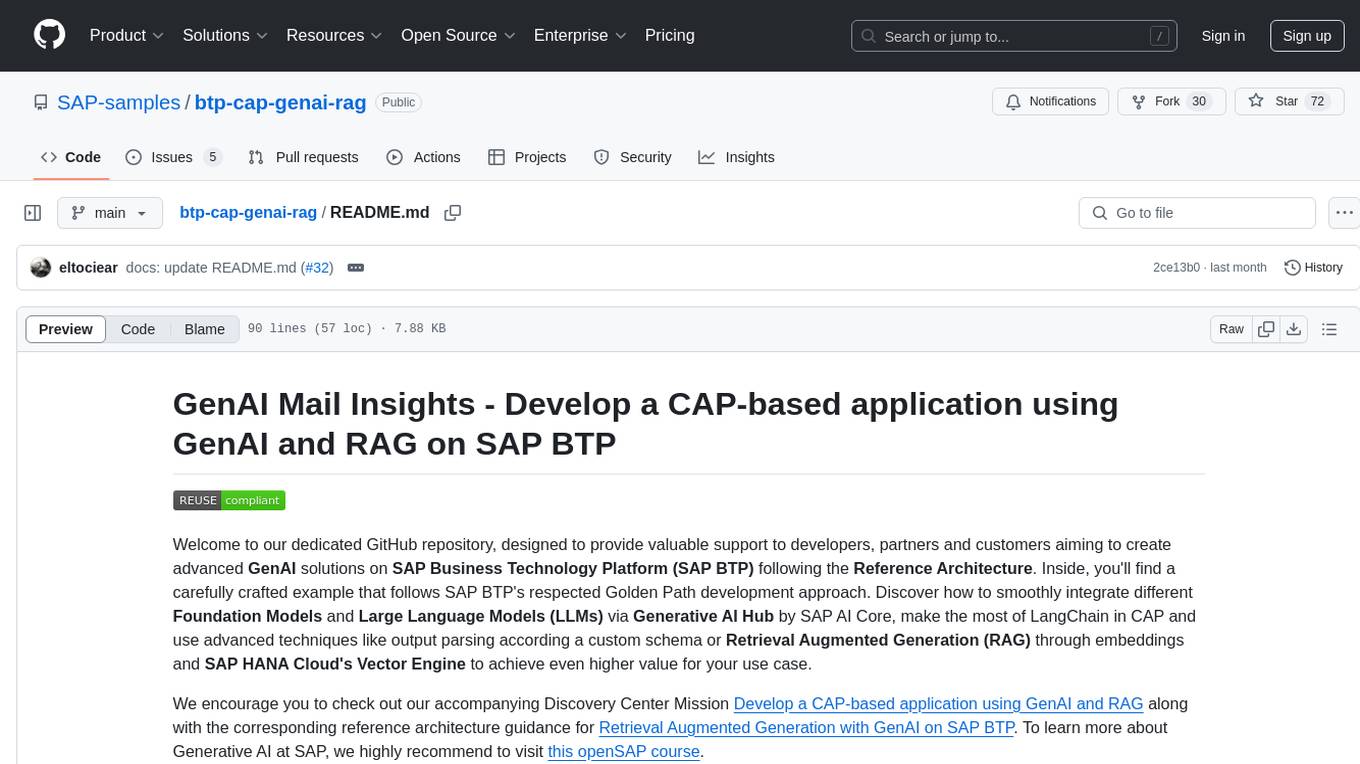
btp-cap-genai-rag
This GitHub repository provides support for developers, partners, and customers to create advanced GenAI solutions on SAP Business Technology Platform (SAP BTP) following the Reference Architecture. It includes examples on integrating Foundation Models and Large Language Models via Generative AI Hub, using LangChain in CAP, and implementing advanced techniques like Retrieval Augmented Generation (RAG) through embeddings and SAP HANA Cloud's Vector Engine for enhanced value in customer support scenarios.
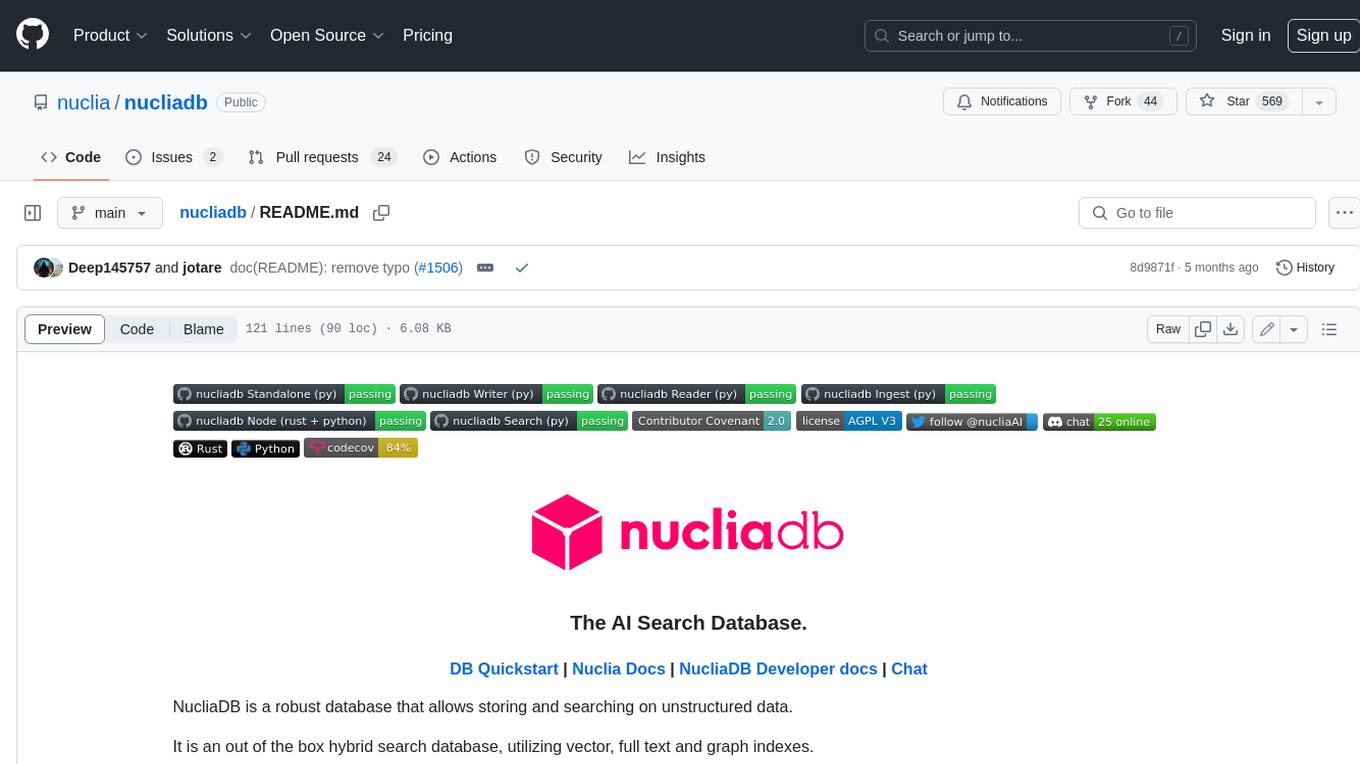
nucliadb
NucliaDB is a robust database that allows storing and searching on unstructured data. It is an out of the box hybrid search database, utilizing vector, full text and graph indexes. NucliaDB is written in Rust and Python. We designed it to index large datasets and provide multi-teanant support. When utilizing NucliaDB with Nuclia cloud, you are able to the power of an NLP database without the hassle of data extraction, enrichment and inference. We do all the hard work for you.
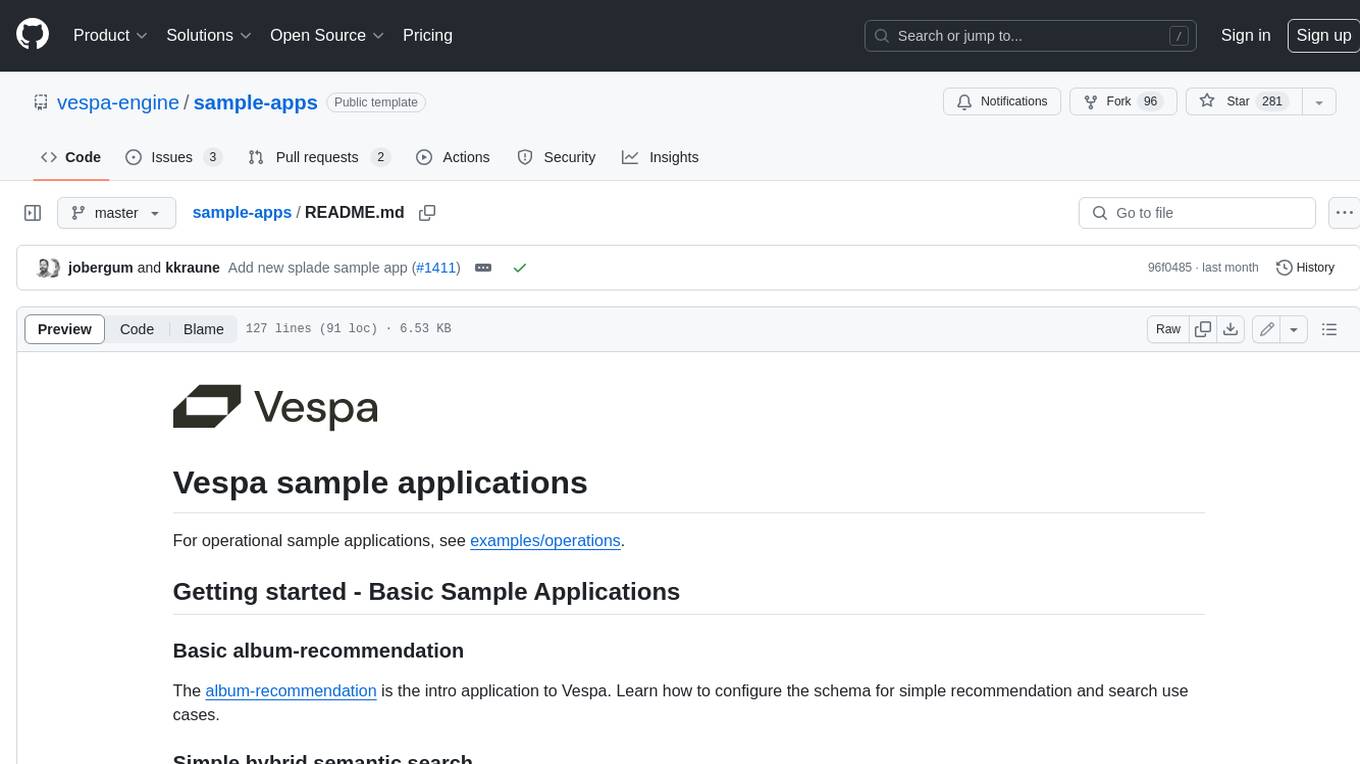
sample-apps
Vespa is an open-source search and AI engine that provides a unified platform for building and deploying search and AI applications. Vespa sample applications showcase various use cases and features of Vespa, including basic search, recommendation, semantic search, image search, text ranking, e-commerce search, question answering, search-as-you-type, and ML inference serving.
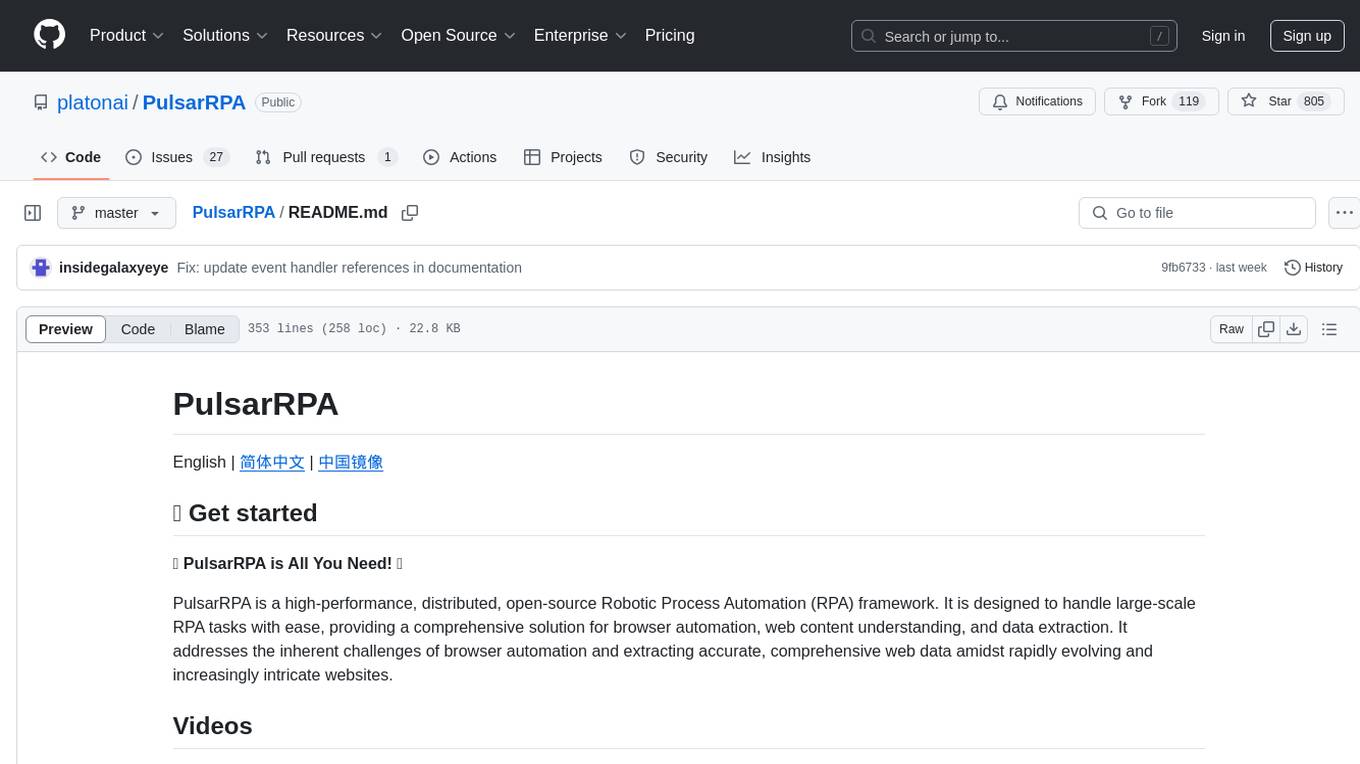
PulsarRPA
PulsarRPA is a high-performance, distributed, open-source Robotic Process Automation (RPA) framework designed to handle large-scale RPA tasks with ease. It provides a comprehensive solution for browser automation, web content understanding, and data extraction. PulsarRPA addresses challenges of browser automation and accurate web data extraction from complex and evolving websites. It incorporates innovative technologies like browser rendering, RPA, intelligent scraping, advanced DOM parsing, and distributed architecture to ensure efficient, accurate, and scalable web data extraction. The tool is open-source, customizable, and supports cutting-edge information extraction technology, making it a preferred solution for large-scale web data extraction.
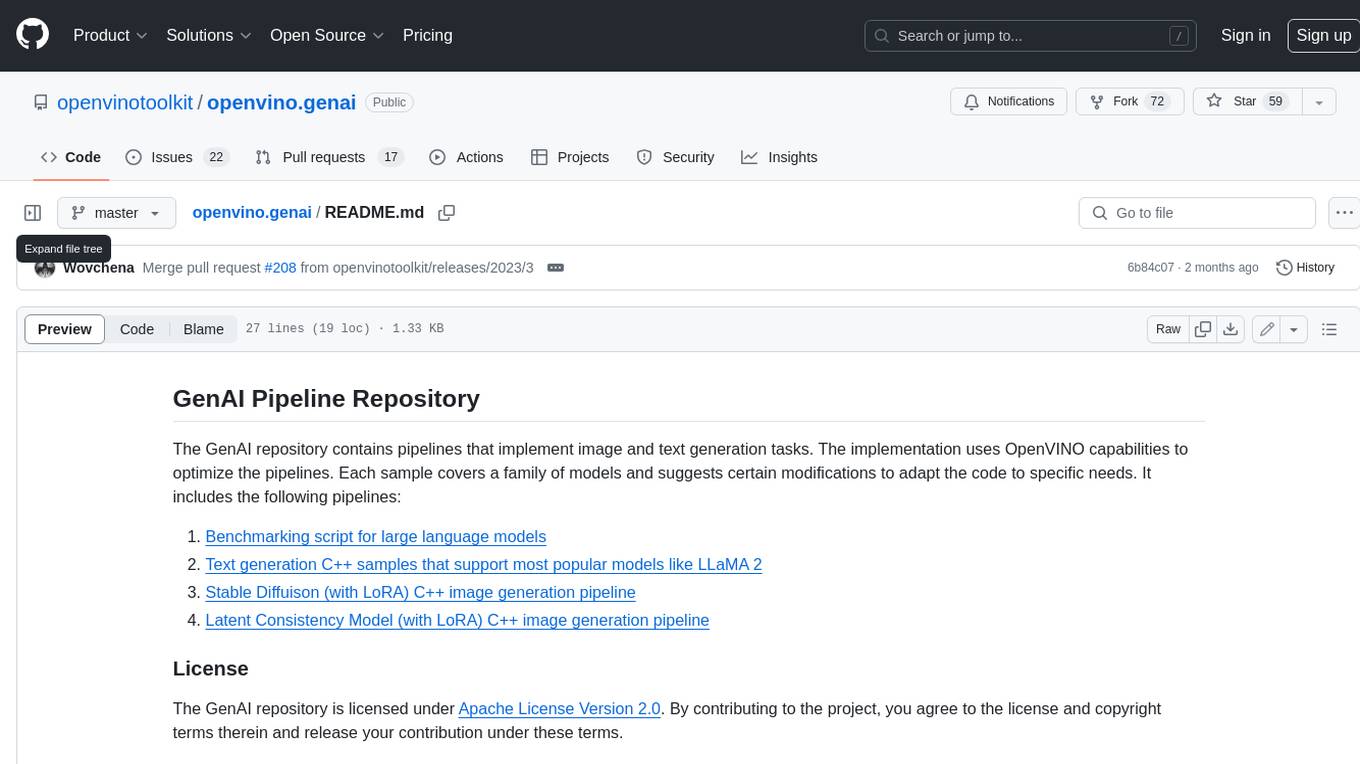
openvino.genai
The GenAI repository contains pipelines that implement image and text generation tasks. The implementation uses OpenVINO capabilities to optimize the pipelines. Each sample covers a family of models and suggests certain modifications to adapt the code to specific needs. It includes the following pipelines: 1. Benchmarking script for large language models 2. Text generation C++ samples that support most popular models like LLaMA 2 3. Stable Diffuison (with LoRA) C++ image generation pipeline 4. Latent Consistency Model (with LoRA) C++ image generation pipeline
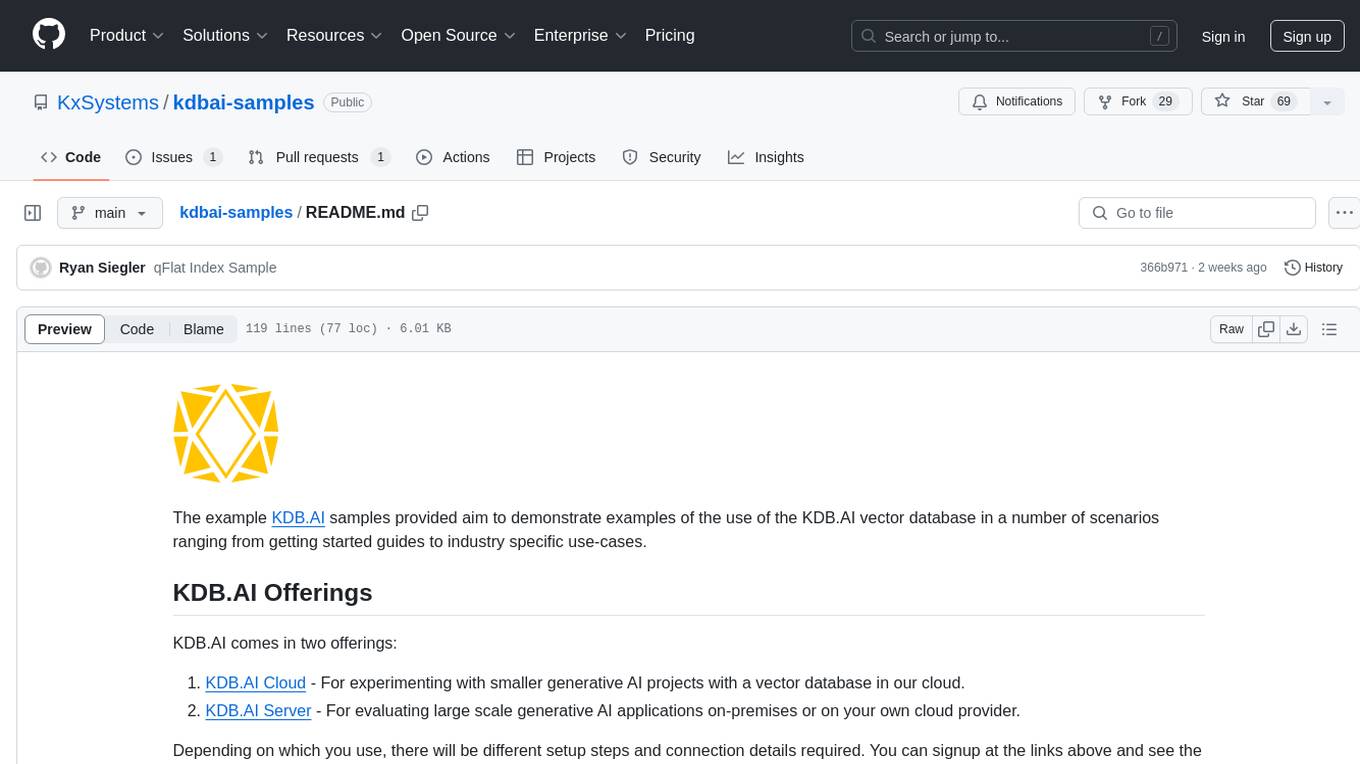
kdbai-samples
KDB.AI is a time-based vector database that allows developers to build scalable, reliable, and real-time applications by providing advanced search, recommendation, and personalization for Generative AI applications. It supports multiple index types, distance metrics, top-N and metadata filtered retrieval, as well as Python and REST interfaces. The repository contains samples demonstrating various use-cases such as temporal similarity search, document search, image search, recommendation systems, sentiment analysis, and more. KDB.AI integrates with platforms like ChatGPT, Langchain, and LlamaIndex. The setup steps require Unix terminal, Python 3.8+, and pip installed. Users can install necessary Python packages and run Jupyter notebooks to interact with the samples.
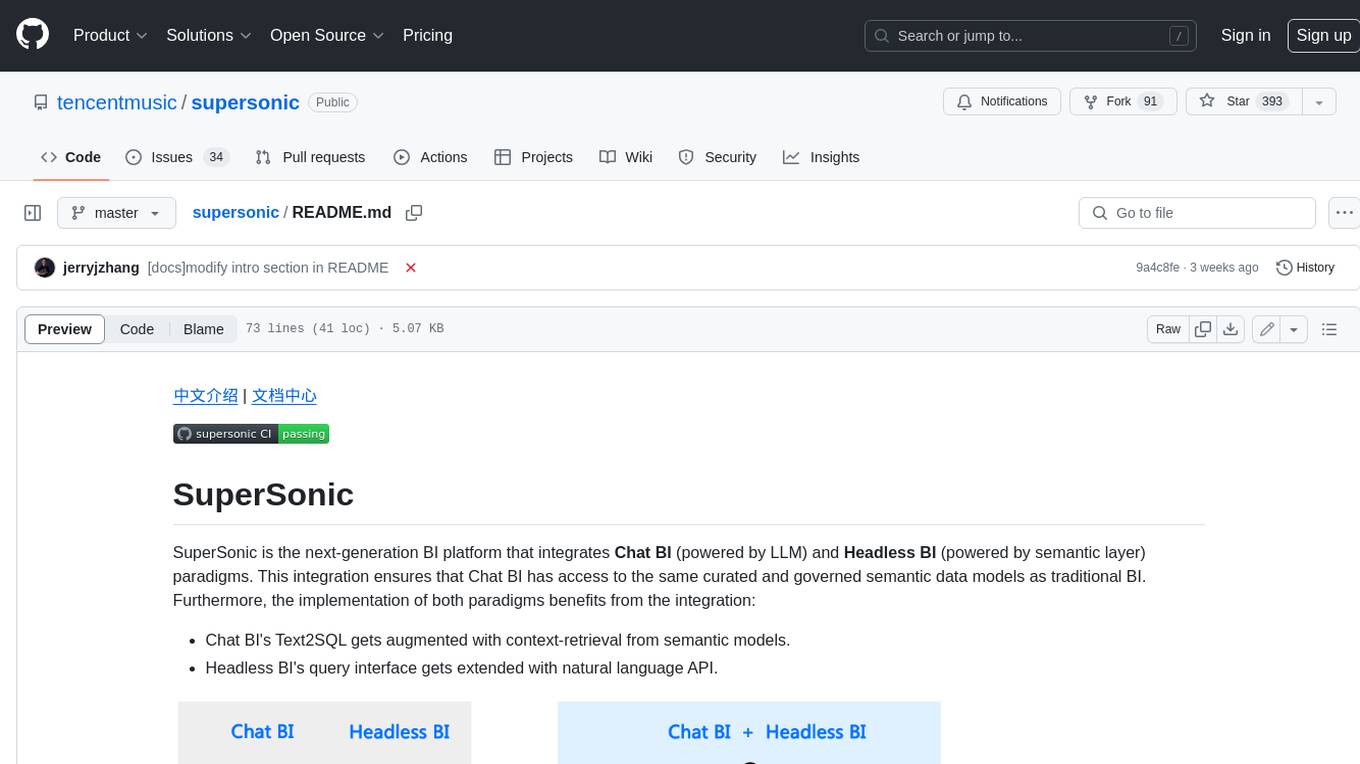
supersonic
SuperSonic is a next-generation BI platform that integrates Chat BI (powered by LLM) and Headless BI (powered by semantic layer) paradigms. This integration ensures that Chat BI has access to the same curated and governed semantic data models as traditional BI. Furthermore, the implementation of both paradigms benefits from the integration: * Chat BI's Text2SQL gets augmented with context-retrieval from semantic models. * Headless BI's query interface gets extended with natural language API. SuperSonic provides a Chat BI interface that empowers users to query data using natural language and visualize the results with suitable charts. To enable such experience, the only thing necessary is to build logical semantic models (definition of metric/dimension/tag, along with their meaning and relationships) through a Headless BI interface. Meanwhile, SuperSonic is designed to be extensible and composable, allowing custom implementations to be added and configured with Java SPI. The integration of Chat BI and Headless BI has the potential to enhance the Text2SQL generation in two dimensions: 1. Incorporate data semantics (such as business terms, column values, etc.) into the prompt, enabling LLM to better understand the semantics and reduce hallucination. 2. Offload the generation of advanced SQL syntax (such as join, formula, etc.) from LLM to the semantic layer to reduce complexity. With these ideas in mind, we develop SuperSonic as a practical reference implementation and use it to power our real-world products. Additionally, to facilitate further development we decide to open source SuperSonic as an extensible framework.
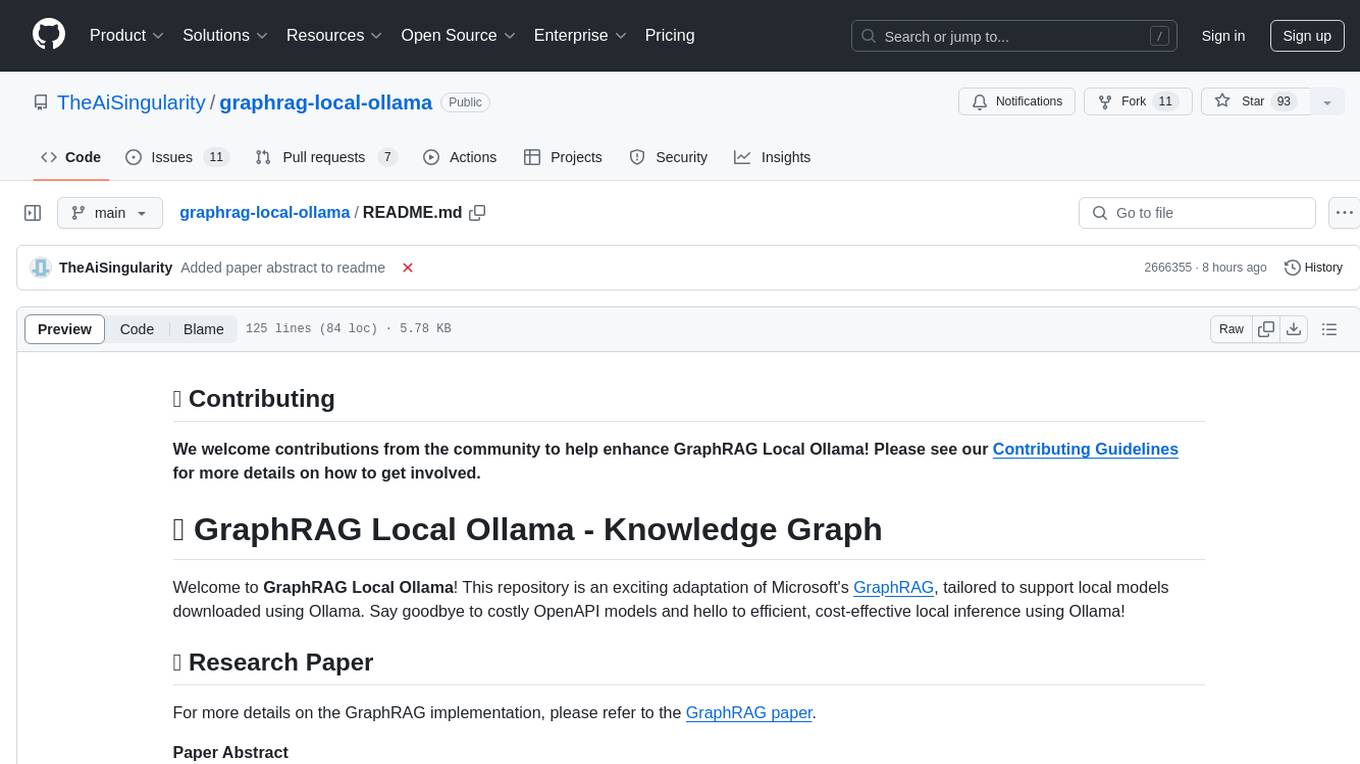
graphrag-local-ollama
GraphRAG Local Ollama is a repository that offers an adaptation of Microsoft's GraphRAG, customized to support local models downloaded using Ollama. It enables users to leverage local models with Ollama for large language models (LLMs) and embeddings, eliminating the need for costly OpenAPI models. The repository provides a simple setup process and allows users to perform question answering over private text corpora by building a graph-based text index and generating community summaries for closely-related entities. GraphRAG Local Ollama aims to improve the comprehensiveness and diversity of generated answers for global sensemaking questions over datasets.
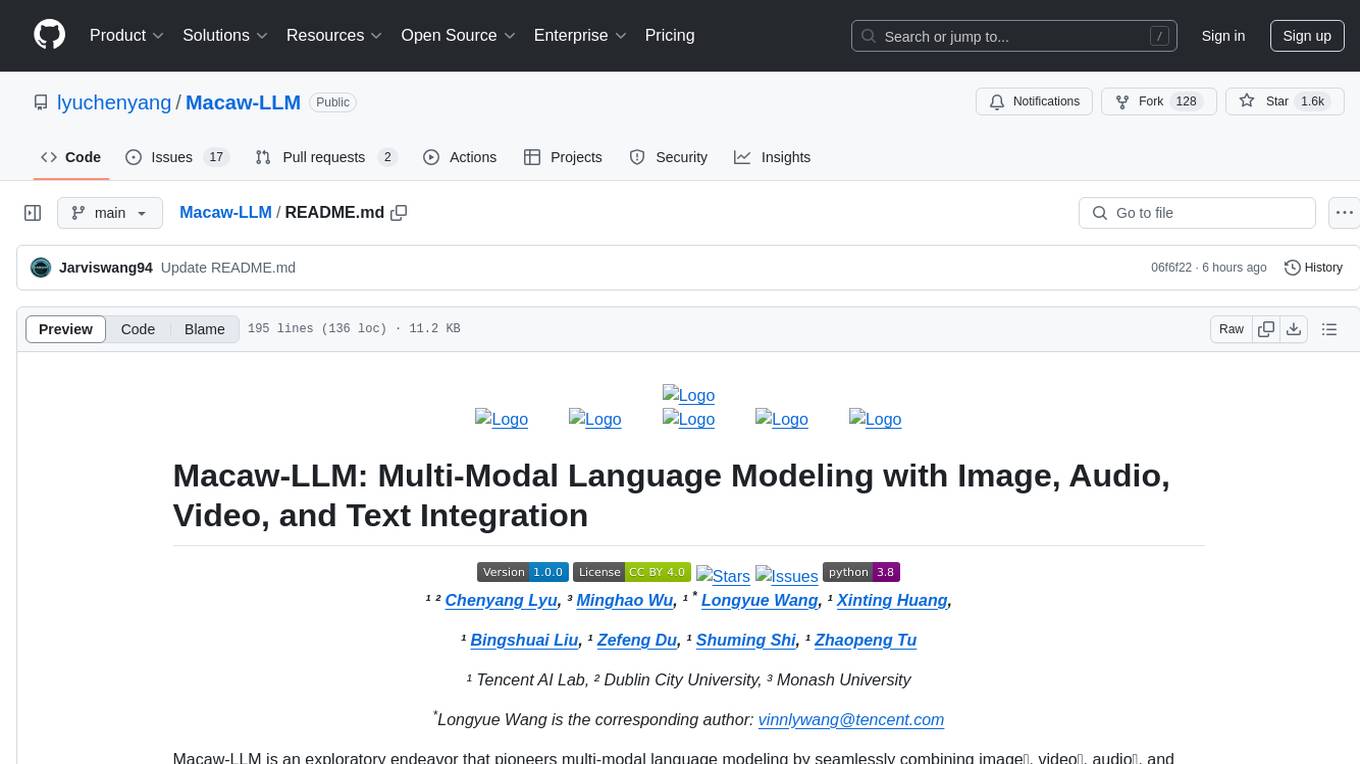
Macaw-LLM
Macaw-LLM is a pioneering multi-modal language modeling tool that seamlessly integrates image, audio, video, and text data. It builds upon CLIP, Whisper, and LLaMA models to process and analyze multi-modal information effectively. The tool boasts features like simple and fast alignment, one-stage instruction fine-tuning, and a new multi-modal instruction dataset. It enables users to align multi-modal features efficiently, encode instructions, and generate responses across different data types.
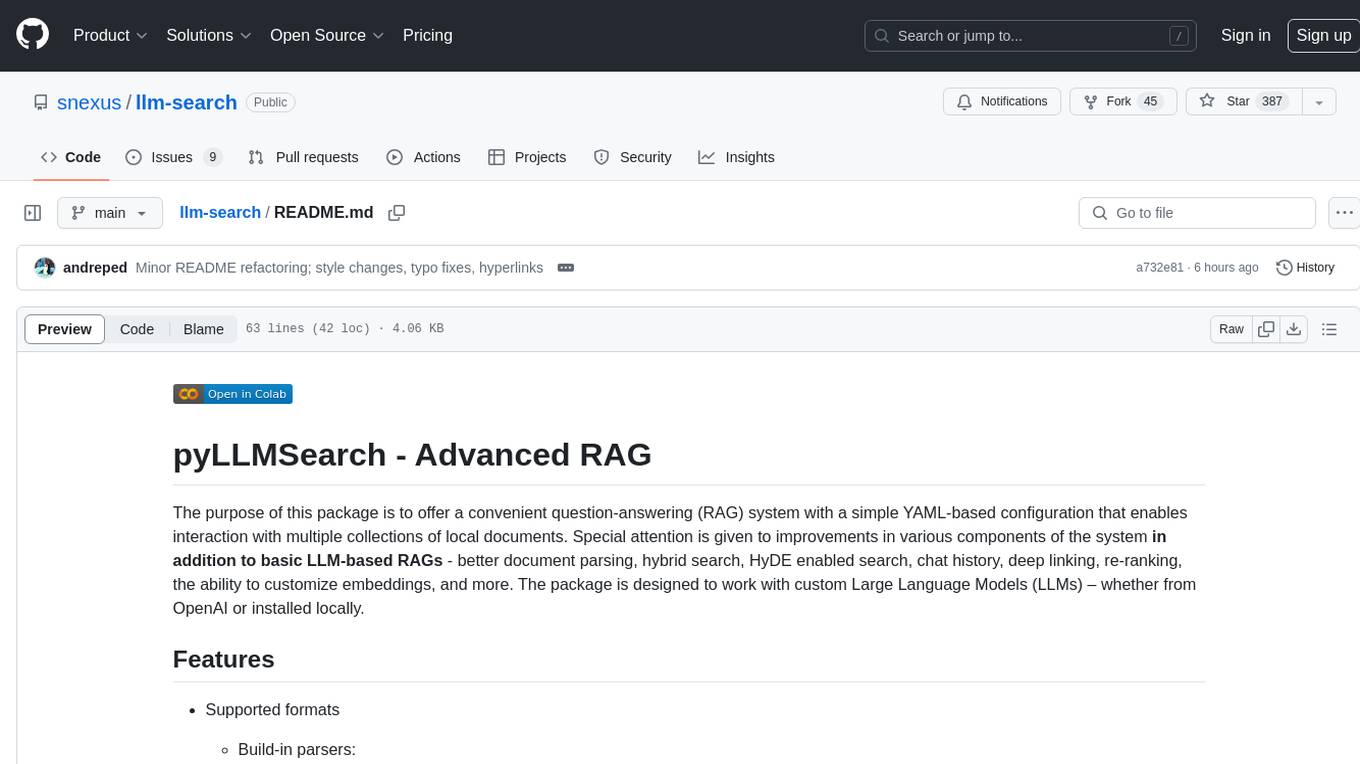
llm-search
pyLLMSearch is an advanced RAG system that offers a convenient question-answering system with a simple YAML-based configuration. It enables interaction with multiple collections of local documents, with improvements in document parsing, hybrid search, chat history, deep linking, re-ranking, customizable embeddings, and more. The package is designed to work with custom Large Language Models (LLMs) from OpenAI or installed locally. It supports various document formats, incremental embedding updates, dense and sparse embeddings, multiple embedding models, 'Retrieve and Re-rank' strategy, HyDE (Hypothetical Document Embeddings), multi-querying, chat history, and interaction with embedded documents using different models. It also offers simple CLI and web interfaces, deep linking, offline response saving, and an experimental API.
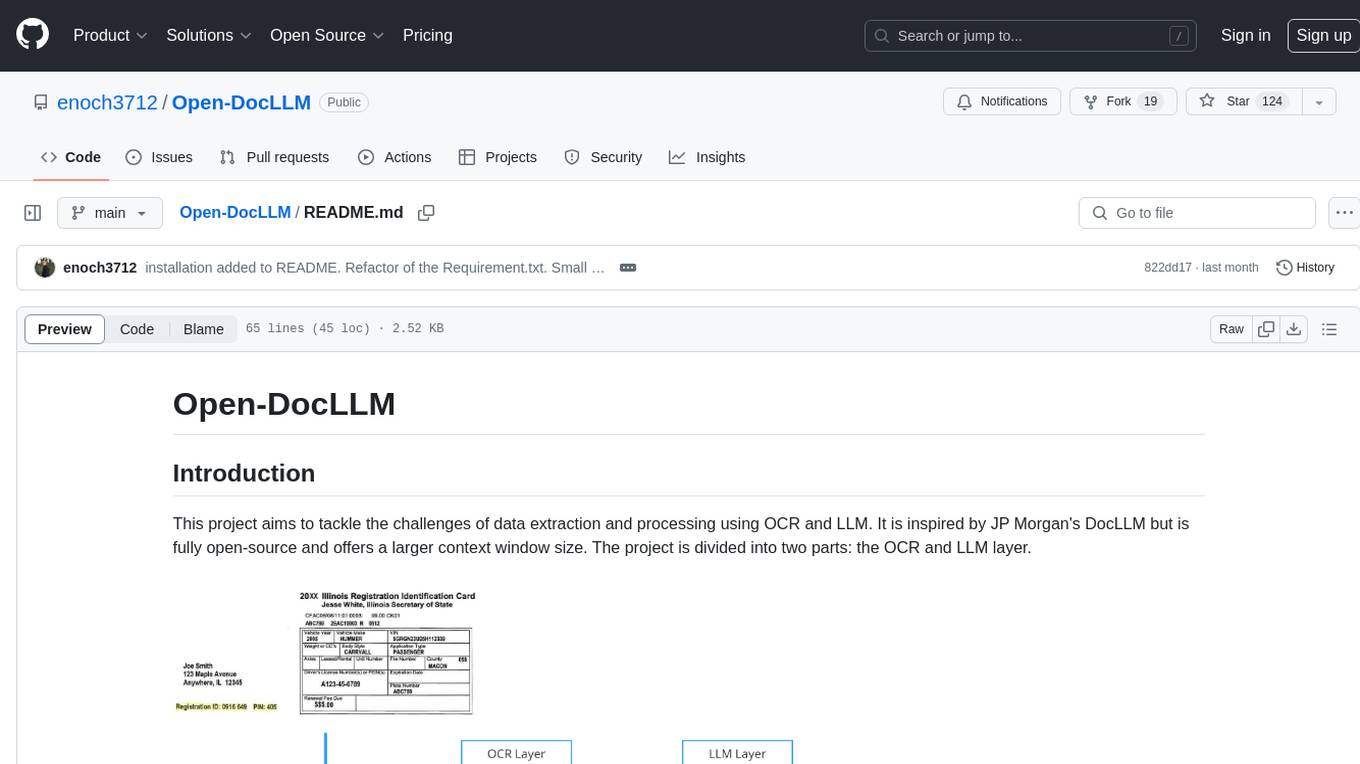
Open-DocLLM
Open-DocLLM is an open-source project that addresses data extraction and processing challenges using OCR and LLM technologies. It consists of two main layers: OCR for reading document content and LLM for extracting specific content in a structured manner. The project offers a larger context window size compared to JP Morgan's DocLLM and integrates tools like Tesseract OCR and Mistral for efficient data analysis. Users can run the models on-premises using LLM studio or Ollama, and the project includes a FastAPI app for testing purposes.
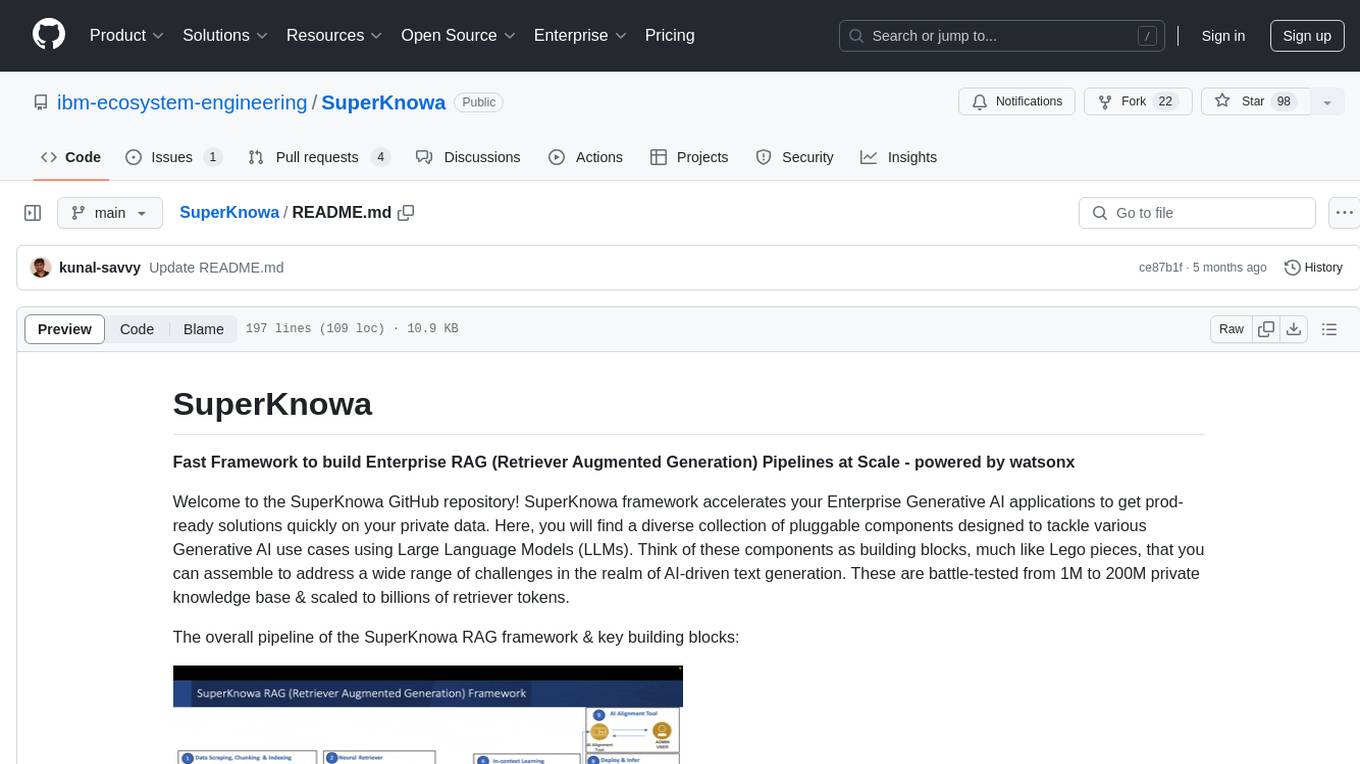
SuperKnowa
SuperKnowa is a fast framework to build Enterprise RAG (Retriever Augmented Generation) Pipelines at Scale, powered by watsonx. It accelerates Enterprise Generative AI applications to get prod-ready solutions quickly on private data. The framework provides pluggable components for tackling various Generative AI use cases using Large Language Models (LLMs), allowing users to assemble building blocks to address challenges in AI-driven text generation. SuperKnowa is battle-tested from 1M to 200M private knowledge base & scaled to billions of retriever tokens.

llm_client
llm_client is a Rust interface designed for Local Large Language Models (LLMs) that offers automated build support for CPU, CUDA, MacOS, easy model presets, and a novel cascading prompt workflow for controlled generation. It provides a breadth of configuration options and API support for various OpenAI compatible APIs. The tool is primarily focused on deterministic signals from probabilistic LLM vibes, enabling specialized workflows for specific tasks and reproducible outcomes.
For similar tasks

LLMStack
LLMStack is a no-code platform for building generative AI agents, workflows, and chatbots. It allows users to connect their own data, internal tools, and GPT-powered models without any coding experience. LLMStack can be deployed to the cloud or on-premise and can be accessed via HTTP API or triggered from Slack or Discord.

ai-guide
This guide is dedicated to Large Language Models (LLMs) that you can run on your home computer. It assumes your PC is a lower-end, non-gaming setup.

onnxruntime-genai
ONNX Runtime Generative AI is a library that provides the generative AI loop for ONNX models, including inference with ONNX Runtime, logits processing, search and sampling, and KV cache management. Users can call a high level `generate()` method, or run each iteration of the model in a loop. It supports greedy/beam search and TopP, TopK sampling to generate token sequences, has built in logits processing like repetition penalties, and allows for easy custom scoring.

jupyter-ai
Jupyter AI connects generative AI with Jupyter notebooks. It provides a user-friendly and powerful way to explore generative AI models in notebooks and improve your productivity in JupyterLab and the Jupyter Notebook. Specifically, Jupyter AI offers: * An `%%ai` magic that turns the Jupyter notebook into a reproducible generative AI playground. This works anywhere the IPython kernel runs (JupyterLab, Jupyter Notebook, Google Colab, Kaggle, VSCode, etc.). * A native chat UI in JupyterLab that enables you to work with generative AI as a conversational assistant. * Support for a wide range of generative model providers, including AI21, Anthropic, AWS, Cohere, Gemini, Hugging Face, NVIDIA, and OpenAI. * Local model support through GPT4All, enabling use of generative AI models on consumer grade machines with ease and privacy.

khoj
Khoj is an open-source, personal AI assistant that extends your capabilities by creating always-available AI agents. You can share your notes and documents to extend your digital brain, and your AI agents have access to the internet, allowing you to incorporate real-time information. Khoj is accessible on Desktop, Emacs, Obsidian, Web, and Whatsapp, and you can share PDF, markdown, org-mode, notion files, and GitHub repositories. You'll get fast, accurate semantic search on top of your docs, and your agents can create deeply personal images and understand your speech. Khoj is self-hostable and always will be.

langchain_dart
LangChain.dart is a Dart port of the popular LangChain Python framework created by Harrison Chase. LangChain provides a set of ready-to-use components for working with language models and a standard interface for chaining them together to formulate more advanced use cases (e.g. chatbots, Q&A with RAG, agents, summarization, extraction, etc.). The components can be grouped into a few core modules: * **Model I/O:** LangChain offers a unified API for interacting with various LLM providers (e.g. OpenAI, Google, Mistral, Ollama, etc.), allowing developers to switch between them with ease. Additionally, it provides tools for managing model inputs (prompt templates and example selectors) and parsing the resulting model outputs (output parsers). * **Retrieval:** assists in loading user data (via document loaders), transforming it (with text splitters), extracting its meaning (using embedding models), storing (in vector stores) and retrieving it (through retrievers) so that it can be used to ground the model's responses (i.e. Retrieval-Augmented Generation or RAG). * **Agents:** "bots" that leverage LLMs to make informed decisions about which available tools (such as web search, calculators, database lookup, etc.) to use to accomplish the designated task. The different components can be composed together using the LangChain Expression Language (LCEL).

danswer
Danswer is an open-source Gen-AI Chat and Unified Search tool that connects to your company's docs, apps, and people. It provides a Chat interface and plugs into any LLM of your choice. Danswer can be deployed anywhere and for any scale - on a laptop, on-premise, or to cloud. Since you own the deployment, your user data and chats are fully in your own control. Danswer is MIT licensed and designed to be modular and easily extensible. The system also comes fully ready for production usage with user authentication, role management (admin/basic users), chat persistence, and a UI for configuring Personas (AI Assistants) and their Prompts. Danswer also serves as a Unified Search across all common workplace tools such as Slack, Google Drive, Confluence, etc. By combining LLMs and team specific knowledge, Danswer becomes a subject matter expert for the team. Imagine ChatGPT if it had access to your team's unique knowledge! It enables questions such as "A customer wants feature X, is this already supported?" or "Where's the pull request for feature Y?"

infinity
Infinity is an AI-native database designed for LLM applications, providing incredibly fast full-text and vector search capabilities. It supports a wide range of data types, including vectors, full-text, and structured data, and offers a fused search feature that combines multiple embeddings and full text. Infinity is easy to use, with an intuitive Python API and a single-binary architecture that simplifies deployment. It achieves high performance, with 0.1 milliseconds query latency on million-scale vector datasets and up to 15K QPS.
For similar jobs

lollms-webui
LoLLMs WebUI (Lord of Large Language Multimodal Systems: One tool to rule them all) is a user-friendly interface to access and utilize various LLM (Large Language Models) and other AI models for a wide range of tasks. With over 500 AI expert conditionings across diverse domains and more than 2500 fine tuned models over multiple domains, LoLLMs WebUI provides an immediate resource for any problem, from car repair to coding assistance, legal matters, medical diagnosis, entertainment, and more. The easy-to-use UI with light and dark mode options, integration with GitHub repository, support for different personalities, and features like thumb up/down rating, copy, edit, and remove messages, local database storage, search, export, and delete multiple discussions, make LoLLMs WebUI a powerful and versatile tool.

Azure-Analytics-and-AI-Engagement
The Azure-Analytics-and-AI-Engagement repository provides packaged Industry Scenario DREAM Demos with ARM templates (Containing a demo web application, Power BI reports, Synapse resources, AML Notebooks etc.) that can be deployed in a customer’s subscription using the CAPE tool within a matter of few hours. Partners can also deploy DREAM Demos in their own subscriptions using DPoC.

minio
MinIO is a High Performance Object Storage released under GNU Affero General Public License v3.0. It is API compatible with Amazon S3 cloud storage service. Use MinIO to build high performance infrastructure for machine learning, analytics and application data workloads.

mage-ai
Mage is an open-source data pipeline tool for transforming and integrating data. It offers an easy developer experience, engineering best practices built-in, and data as a first-class citizen. Mage makes it easy to build, preview, and launch data pipelines, and provides observability and scaling capabilities. It supports data integrations, streaming pipelines, and dbt integration.

AiTreasureBox
AiTreasureBox is a versatile AI tool that provides a collection of pre-trained models and algorithms for various machine learning tasks. It simplifies the process of implementing AI solutions by offering ready-to-use components that can be easily integrated into projects. With AiTreasureBox, users can quickly prototype and deploy AI applications without the need for extensive knowledge in machine learning or deep learning. The tool covers a wide range of tasks such as image classification, text generation, sentiment analysis, object detection, and more. It is designed to be user-friendly and accessible to both beginners and experienced developers, making AI development more efficient and accessible to a wider audience.

tidb
TiDB is an open-source distributed SQL database that supports Hybrid Transactional and Analytical Processing (HTAP) workloads. It is MySQL compatible and features horizontal scalability, strong consistency, and high availability.

airbyte
Airbyte is an open-source data integration platform that makes it easy to move data from any source to any destination. With Airbyte, you can build and manage data pipelines without writing any code. Airbyte provides a library of pre-built connectors that make it easy to connect to popular data sources and destinations. You can also create your own connectors using Airbyte's no-code Connector Builder or low-code CDK. Airbyte is used by data engineers and analysts at companies of all sizes to build and manage their data pipelines.

labelbox-python
Labelbox is a data-centric AI platform for enterprises to develop, optimize, and use AI to solve problems and power new products and services. Enterprises use Labelbox to curate data, generate high-quality human feedback data for computer vision and LLMs, evaluate model performance, and automate tasks by combining AI and human-centric workflows. The academic & research community uses Labelbox for cutting-edge AI research.



































